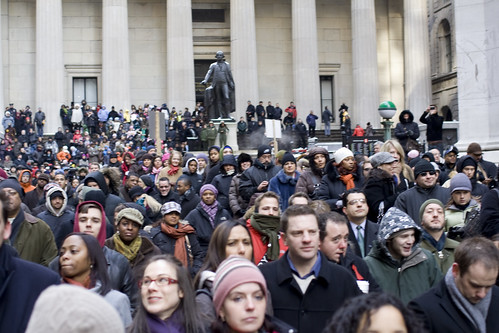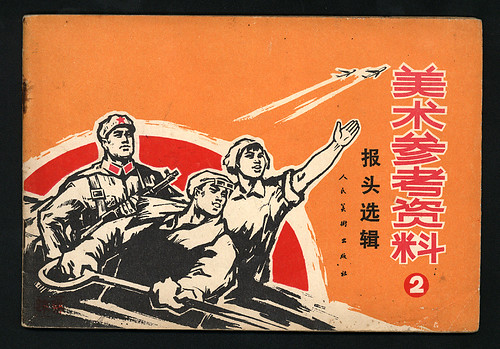
Deep Thought – Jaques Derrida Edition
 Jaques Derrida, originally uploaded by TheAlieness GiselaGiardino²³
Jaques Derrida, originally uploaded by TheAlieness GiselaGiardino²³
I wonder if the Derrida Estate gives a kickback to Peter Eisenman? I ask because I am reading Eisenman’s Ten Canonical Buildings 1950-2000 and the Derrida Estate deserves 2-4% of the list price.
Book review forthcoming.
44th Presidential Inauguration
 44th Presidential Inauguration
44th Presidential Inauguration
I don’t do personal politics on this website, even when covering how politics, urbanity and architecture intersect. But I would like to talk about what happened today.
Today I stood next to the New York Stock Exchange to witness Barack Hussein Obama sworn in as American’s 44th President. Standing in the cold with me were friends, tourists, NYSE brokers, and citizens of the United States. Everyone was smiling, in a city where smiles on the street are rare. This glorious, and peaceful, handover of power makes me proud to be an American.

While being in Washington D.C. would have been an honor, standing at the site of the first Inauguration brings history full circle. Serving as our backdrop was Federal Hall, where on April 30th, 1789 George Washington was sworn in as this nation’s first President; this was a moment of great hope and change as America moved from a confederacy of states to a republic. The eight years between the ratification of the Articles of Confederation and the ratification of the Constitution in 1788 proved a trying time for the young country as war, internal strife and economic hardships enveloped the fledgling democracy. There was many doubters and those who were afraid of change and the unknown, so when President Obama spoke of not fearing change, please think of what the nation was going through in 1787 when debating the Constitution:
Now, there are some who question the scale of our ambitions — who suggest that our system cannot tolerate too many big plans. Their memories are short. For they have forgotten what this country has already done; what free men and women can achieve when imagination is joined to common purpose, and necessity to courage.
Our Founding Fathers didn’t fear the change in moving toward a more perfect Union, and reshaping the role of our government. Our needs are similar: we must not be afraid to make the same choices in order to perfect our Union; to ensure that all American have health care; that all are provided Social Security; that our soldiers are brought home safely and cared for before, during and after their service to our country; that our financial industry is fully regulated, as it once was, to ensure that the economy is not again brought to the brink of destruction; that our cities are made whole again through reducing our need for personal vehicles, the increase in transit and the funding of sustainable building practices; to resurrect America’s standing in the world; and, to right the wrongs o f the last eight years, be they our policies on torture, diplomacy, safety, or the economy. This is our moment.
It is our duty to not betray the work and sacrifice of those who came before us. 220 years ago our country was on the brink of collapse, and we came together to perfect our great political system. Today we are at the same point in history – our leaders, and our citizens, must not shirk from their responsibility to protect and defend this nation’s citizens.
2009-01-20

Inauguration Fever

I Have A Dream
As is my wont and tradition, here is Martin Luther King Jr’s I Have a Dream speech, one day before President-elect Barack Obama will officially be sworn into office.
Cultural Revolution Clip Art
2009-01-16

Ecological Arbitrage: 311 Exxon Valdez Oil Spills
 Oil Refinery, originally uploaded by WAXY.
Oil Refinery, originally uploaded by WAXY.
In today’s New York Times article, Where Is Oil Going Next?, a long discussion of the volatile oil market hides these interesting paragraphs:
With storage tanks filling up onshore, private and national oil companies, refiners and trading companies are storing another 80 million barrels aboard 35 supertankers and a handful of smaller tankers, the most in 20 years, according to Frontline Ltd., the world’s largest owner of supertankers.
The different players have different reasons for storing oil, whether onshore or offshore.
National oil companies are hoping to reverse the price slide by holding oil off the market. Iran alone is reportedly using as many as 15 tankers to store crude oil in hopes that higher prices will prop up its economy, which is dependent on oil exports.
Think for a second: you can make more money buying oil now, paying to store it on land or leasing a ship, and then sell it a year later. At what point does risk management come into the picture to ask about all of that oil on the high seas, just going to and fro, and the safety of the oil tankers? The Exxon Valdez Oil Spill contained approximately 10.8 million U.S. gallons – at this time, there is enough floating oil for over 311 Exxon Valdez spills. This is a disaster waiting to happen. Or what of the Somali Pirates?
At what point does this ecological arbitrage impact regions and the greater ecosystem? Being that this article was found the Business Section, this question wasn’t raised. Carbon taxing wouldn’t mitigate this arbitrage, but it might make it more expensive.
Future Systems Jan Kaplicky Passes
 127 discs, originally uploaded by reverendpixel
127 discs, originally uploaded by reverendpixel
Jan Kaplicky dies: Foster, Rogers lead tributes to ‘irreplaceable’ architect.
.
